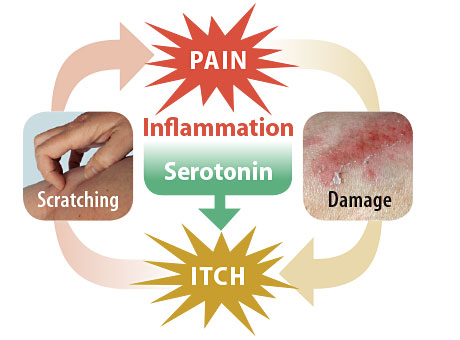
Scratching an itch, left, causes minor pain, top, prompting the brain to release serotonin. Serotonin reacts with neuronal receptors that carry itch signals to the brain, making itching worse.

Scratching an itch, left, causes minor pain, top, prompting the brain to release serotonin. Serotonin reacts with neuronal receptors that carry itch signals to the brain, making itching worse.
Turns out your mom was right: Scratching an itch only makes it worse. New research indicates that scratching causes the brain to release serotonin, which intensifies the itch sensation.
The findings, in mice, are reported online in the journal Neuron. The same vicious cycle of itching and scratching is thought to occur in humans, and the research provides new clues that may help break that cycle, particularly in people who experience chronic itching.
Scientists have known for decades that scratching creates a mild amount of pain in the skin, said senior investigator Zhou-Feng Chen, PhD, director of the university’s Center for the Study of Itch. That pain can interfere with itching — at least temporarily — by getting nerve cells in the spinal cord to carry pain signals instead of itch signals to the brain.
“The problem is that when the brain gets those pain signals, it responds by producing the neurotransmitter serotonin to help control that pain,” Chen said. “But as serotonin spreads from the brain into the spinal cord, we found the chemical can ‘jump the tracks,’ moving from pain-sensing neurons to nerve cells that influence itch intensity.”
The researchers bred a strain of mice that lacked the genes to make serotonin. When those genetically engineered mice were injected with a substance that normally makes the skin itch, the mice didn’t scratch as much as their normal littermates. When the genetically altered mice were injected with serotonin, they scratched as might be expected in response to itch-inducing compounds.
However, Chen said it’s not practical to treat itching by blocking serotonin release. Serotonin is involved in growth, aging, bone metabolism and in regulating mood. Blocking serotonin would have consequences throughout the body, and people wouldn’t have a natural way to control pain.
Instead, it might be possible to interfere with the communication between serotonin and nerve cells in the spinal cord that specifically transmit itch. To work toward that goal, Chen’s team isolated the receptor used by serotonin to activate these neurons.